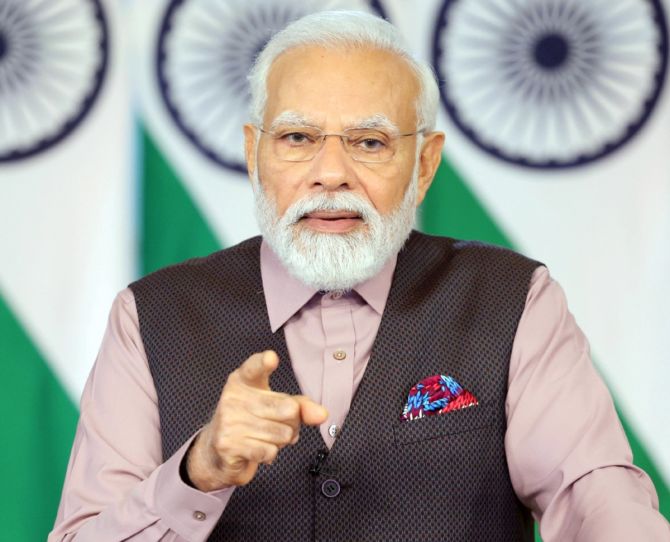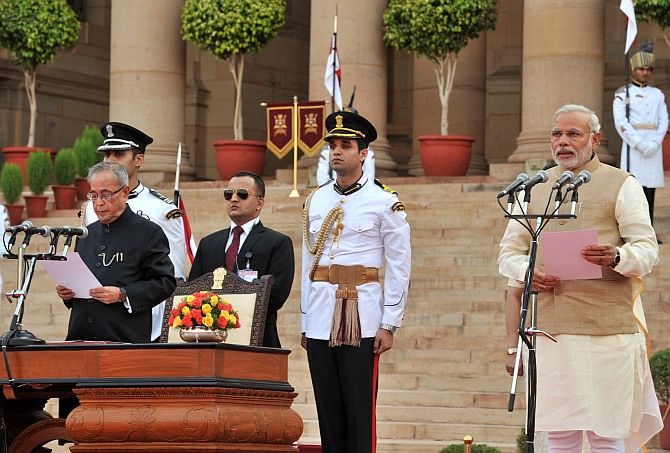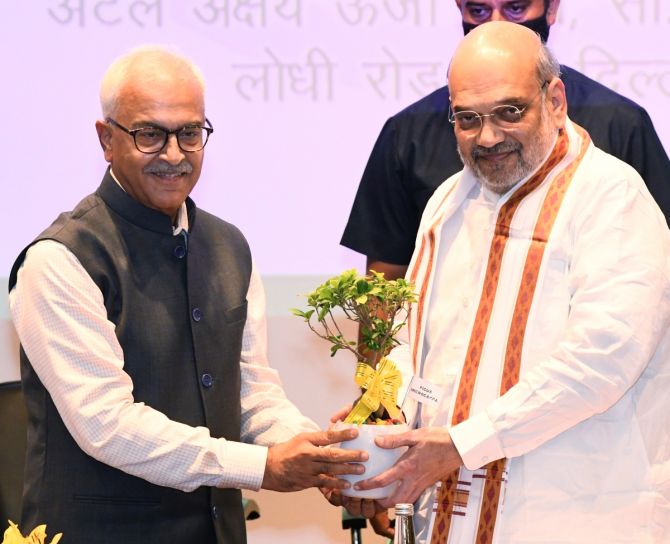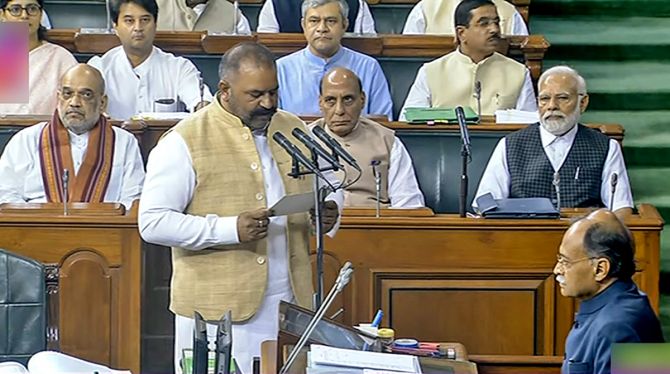None of these career extensions seems to have been caused by the indispensability of the selected incumbent or the non-availability of talent down the bureaucratic pyramid.
It all may owe to Modi's 'comfort zone', where he can trust individual officers and their judgement, their understanding of working with a do-or-die prime minister, observes N Sathiya Moorthy.

Recent reports about a third extension granted to Cabinet Secretary Rajiv Gauba and the fourth extension for Union Home Secretary Ajay Kumar Bhalla have caused eyebrows to rise in many circles.
Both get a one-year extension, say, that is, until after next year's Lok Sabha elections, and the twin questions on the government decision centres on their indispensability and whittled career chances of others down the line.
This is not the first time that the Cabinet secretary has stayed on in office for a long time, but the current extension, until August 2024, makes Gauba, a 1982 batch Jharkhand cadre IAS officer, the longest-serving CS. Gauba incidentally was the home secretary before elevation to the nation's top-most civil service position.
Before him, B D Pande had served in the same position for five years, from 1972. But that was in the era before the Supreme Court, in 2013, had ensured a minimum two-year term for those at the top of the bureaucratic pyramid.
More recently, however, the very same Supreme Court had the occasion to quiz the Centre if it there was no other officer than incumbent S K Mishra for the ED director's job, last month.
That was after the court had 'refused to interfere' with the government's order of the previous year, which retrospectively amended Mishra's appointment order to grant him one-year extension in the 'Common Cause' case, in 2021.
This time round, the Supreme Court however held as 'illegal' two successive extensions of one year each granted to Mishra and said the Centre's orders were in 'breach' of the writ of mandamus issued in the 2021 'Common Cause' verdict that the IRS officer should not be given further extension of service.
During the hearing of the case, the bench asked Solicitor General Tushar Mehta, appearing for the Union of India, if the entire department is 'full of incompetent people' except incumbent S K Mishra.
'Are we not giving a picture that there is no other person and the entire department is full of incompetent people?' the bench sought to know.
In the normal course, it should also involve the way international interlocutors perceive the competence of other ED officers from the country.
Yet, the court allowed Mishra to continue in the post till July 31, after taking into consideration the concerns expressed by the Union government regarding peer review of the international Financial Action Task Force (FATF) and smooth transfer of power.
On further representation by the Centre, the Bench comprising Justices B R Gavai, Vikram Nath and Sanjay Karol granted a further extension in 'larger public and national interest' but that Mishra will cease to remain ED chief from the midnight of September 15.
This is a month less than the original period of governmental extension for the incumbent -- a token demonstration of the judiciary's watchdog control over the executive, so to say.

It is not as if Prime Minister Narendra D Modi's government has a soft corner only for top-most bureaucrats heading various departments that are considered the nerve-centre of civilian political administration.
The government had granted a year-after-year extension to then Attorney General K K Venugopal, until he said a firm 'No' last year, citing advancing age.
Even then, Mukul Rohatgi, who was the Modi government's maiden AG, was said to be the first choice.
Only after he declined the offer did the government begin looking around for another candidate. Today, R Venkataramani is the attorney general.
In a way, none of these career extensions at the top seems to have been caused by the indispensability of the selected incumbent or the non-availability of talent down the bureaucratic pyramid.
Many speculative theories and instances have been cited as the cause for such decisions, but none of them seem to fit the bill.
Instead, it all may owe to Modi's 'comfort zone', where he can trust individual officers (going beyond bureaucratic loyalty to the institution) and their judgement, their understanding of working with a do-or-die prime minister, and also to his limited or non-exposure to the way the Government of India worked when he came to power in 2014.
True, Modi is not the first regional politician to become prime minister directly without any experience or exposure to the Delhi Durbar -- though in reality, it means much more than what the term implies, half-mockingly.
Before Modi, Karnataka Chief Minister H D Deve Gowda was parachuted to be the PM, but he possibly did not expect to stay on for long, or for his post-poll coalition to survive beyond a year or two. In the process, Deve Gowda was PM for just about ten months, from June 1996 to April 1997.

That was not the case with Modi, who came to Delhi as a novice after winning the 2014 parliamentary polls but with a thunderous majority.
He had been Gujarat chief minister for three terms, and was seen as a very successful one at that.
After a point, and especially at the time of elections 2014, his 'Gujarat model' of development had crowded out the 'Gujarat riots' (2002) out of national discourse for most parts. And his BJP-NDA had offered the 'Gujarat model' as a dream scheme for the whole nation at the time.
Yet, there were areas of political administration in which the new PM was not very well exposed to, especially from this side of the table.
Included in this were areas such as public finance and monetary policy, defence and national security, among others.
Even visualising the nation as a developmental concept akin to a single-state 'Gujarat experience' would not have helped, given the diversity that India really was/is.
As the new prime minister, Modi was credited with bringing with him most bureaucrats from his chief ministerial secretariat in Gandhi Nagar, people who knew how he thought, spoke and worked -- thus making the transition smooth and comfortable for him, especially in the early months.
Even a whisper campaign was on in capital Delhi how many of those officials, especially in the prime minister's office, with proven competence at the state-level, had had no recent exposure (if at all) to the way the Government of India worked -- and had to work.
Much of it was lost in the din of the celebratory mood of and for the government that lasted, not just for weeks and months but for years.
There are those who still argue that some of the avoidable pitfalls of the government like 'demonetisation without preparations' owed to this lack of experience and exposure of the PMO bureaucracy.
It was further argued that those officials worshipped the path that the PM took, convinced as they were with his visionary zeal and commitment.
It was not for them to tell the boss that things could be done differently -- especially after a decision had been taken.

All of it speaks only about one thing -- that the PM liked operating within a 'comfort zone', created by a set of officials, familiar with his ways.
In a different set-up it would have worked even better but not in a democracy, where both the elected leader and the selected bureaucrats have fixed terms of tenure.
However, it is this latter that the yearly extensions granted to individual bureaucrats have come to be the cause and justification -- as if coinciding with the elected term of a prime minister and his government.
There is thus no need to conjure up 'conspiracy theories', especially about the need for staying on with the incumbent, if only to ensure continued 'misuse' of the ED apparatus, or those of the I-T and/or CBI, to wreck 'political vendetta' against non-NDA politicians, including ministers and chief ministers.
Yet, there is the dichotomy of the BJP-ruled Centre wanting full freedom for the executive to make and unmake senior bureaucratic appointments, but does not want to confer the same right with other popularly-elected governments like that of the Aam Admi Party in Delhi, under Chief Minister Arvind Kejriwal.
Opposition speakers in Parliament referred to what they called an 'irony' during the debate on the Delhi Bill for a CM-led bureaucratic committee with two state officials to decide on all bureaucratic appointments, that too after the Supreme Court had struck down the Centre's assumed powers over such matters, promulgated through an ordinance.
Opposition speakers in Parliament had referred to the 'irony' during the debate on the bill that sought to negate the effect of the Supreme Court judgment that had stuck down the ordinance.
Incidentally, as Gujarat chief minister, Modi had fought for the rights of (all) states in every aspect of administration -- including when party veteran Atal Bihari Vajpayee was the BJP-NDA prime minister at the turn of the century -- but not anymore, it now looks like.
Is it because Modi has come to see the other side of national political administration as PM of a diverse country as India?
Or, is it because he is tuned to wanting his way and having it too, be it as chief minister earlier and prime minister, since?
After all, he is believed to have made a self-vow to enter the Gujarat assembly only as chief minister and Parliament, only as prime minister -- not anything less, say, starting as a mere minister and/or lawmaker.
Before Modi, prime ministers such as Jawaharlal Nehru, Indira Gandhi and Rajiv Gandhi too had had their way with bureaucratic and even constitutional appointments.
Thus, you had the 'supersession of judges' in the Indira Gandhi era, when Justice A N Ray became the Chief Justice of India over the heads of the three judges above him.
But then, the three judges that Ray superseded -- namely, Justices J M Shelat, K S Hegde and A N Grover -- quit office, for what was seen as their considered Constitutional position in the Kesavananda Bharati case (1973).
After Justice A N Ray's retirement -- no one is talking about a service extension for Supreme Court justices -- the Indira Gandhi government superseded Justice H R Khanna to name Justice M H Beg as the CJI. It was for Justice Khanna's position in the 'Fundamental Tights case' (ADM Jabalpur case) during the Emergency.
Why, as PM, Nehru had superseded Justices Patanjali Shastri and M C Mahajan to elevate B K Mukherjee as CJI in 1951, and repeated the feat a decade and more later in 1964, with Justice Gajendragadkar over the rightful claims of Justice Imam, who was said to be suffering from a 'mental illness'.
Rajiv Gandhi as prime minister even had the temerity to 'sack' Foreign Secretary A P Venkateswaran at a news conference.
The maiden Modi government came close to it when it replaced Foreign Secretary Sujatha Singh with S Jaishankar, after cutting short the former's term, extended by the predecessor government of Prime Minister Manmohan Singh.

It is another matter that Modi's 'comfort zone' extends also to his senior political aides in the government and otherwise, too.
Thus you had his old friend and aide Amit A Shah becoming party chief when Modi's candidacy for the PM's job became apparent ahead of elections 2014.
After the 2019 Lok Sabha polls, Shah also became Modi's go-to man for the party and officials, as the strongest home minister, more than even Sardar Patel and L K Advani in their time.
Even years after J P Nadda replaced Shah as the party chief, it is the latter who keeps calling the shots all the time -- as the 'conscience-keeper' of the PM.
Down the line, given his limited exposure to diplomacy, Modi elevated his erstwhile foreign secretary Jaishankar as external affairs minister, pleased as he was with the latter's handling of his maiden prime ministerial visit to the once adversarial America where the other was the Indian ambassador.
In the finance ministry, after the death of old friend and personal lawyer Arun Jaitley, likewise, Nirmala Sitharaman has become the second longest serving head (four years and 67 days) after Morarji Desai's two stints totalling seven years and 324 days.
In his first innings, Morarji put in five years and 122 days, 1958-1963, with Nehru as PM. And Desai, mind you, is still remembered for being the most difficult of senior ministers for any PM to handle -- including himself, in the era immediately after the Emergency (1977-1978).
N Sathiya Moorthy, veteran journalist and author, is a Chennai-based policy analyst & political commentator
Feature Presentation: Rajesh Alva/Rediff.com










